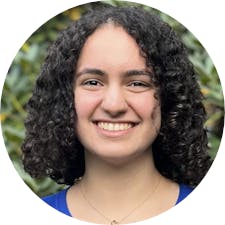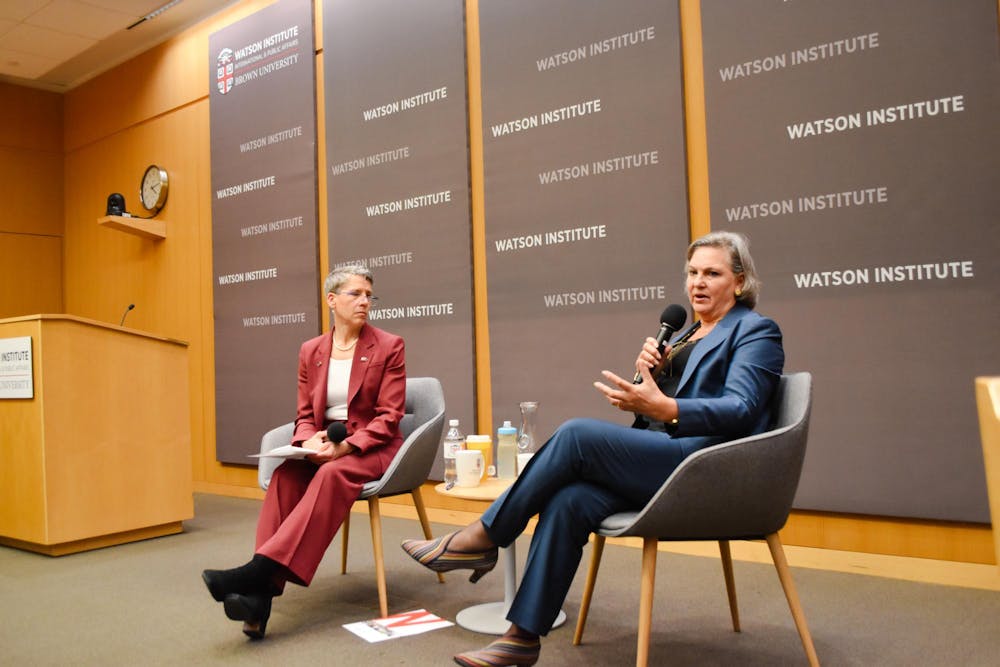On Tuesday evening, Ambassador Victoria Nuland ’83 discussed the Russia-Ukraine conflict, American alliances and the impending Trump administration at a campus event on American diplomacy.
The event, titled “American Diplomacy in the 21st Century,” was hosted by the Watson Institute for International and Public Affairs and moderated by Watson Policy Mentor Suzi LeVine ’93 P’25 P’27, the former U.S. Ambassador to Switzerland and Liechtenstein.
Nuland worked as a U.S. diplomat for 35 years, serving under six U.S. presidents and ten secretaries of state from both political parties. She was acting deputy secretary of state under President Joe Biden and was the U.S. Ambassador to NATO during President George W. Bush’s second term. Nuland retired from the State Department earlier this year and currently works at the Columbia School of Public Affairs.
Nuland has been notably outspoken in her support of Ukraine in their war with Russia. Reflecting on Russia’s annexation of Crimea, Nuland said at the event that the U.S. “should have put more global pressure on Putin at that time.”
She emphasized the importance of furthering U.S. aid to Ukraine.
“I still think that it is essential that the free nations support Ukraine’s sovereignty,” Nuland said of the current conflict. She sees it as a way to set a deterrence for other autocratic nations not to violate the international rules-based order.
During the question and answer portion of the event, a student asked about where the U.S. might have to “draw the line” on its aid to Ukraine, especially if the war persists.
While Nuland did not specify a specific red line, she said “it would be a big decision for us to deny Ukraine that support in the face of this level of aggression and horror from its neighbor.” Nuland also noted that this would be crucial for defining an “international precedent” for protecting allies.
LeVine asked Nuland what she expected for U.S. foreign policy during Trump’s second presidential term.
Nuland noted the significant “benefit to the United States to have Democratic allies and partners.” She also said she opposed Trump’s “rough” handling of American allies, pointing to his threats to pull aid from NATO should other countries not increase their financial contributions to the alliance.
“There are so many countries … who would like to have a good relationship with the United States, but will choose other friends if we are not a welcoming partner,” Nuland said.
She added that although Trump has a right to dictate his policies however he sees fit, U.S. citizens must not allow democratic institutions — such as checks and balances, separation of powers and an independent judiciary — to be harmed.
“There’s no question that political discourse has gotten a lot coarser in this country,” Nuland told The Herald in an interview after the event. But she made a distinction between threatening democracy and “using the democratic system to undercut democracy,” something she said happened “in places like Russia, Venezuela and El Salvador.”
“I don’t want to see the United States go down that road,” she added.
A Brown alum herself, Nuland said at the event that her experiences at Brown were “formative” to her career. She spotlighted former Professor of Soviet and Eastern European History Tom Gleason as her mentor, guiding her studies and interests in international affairs.
“He encouraged me to explore the history of countries and peoples who have liberated themselves from totalitarianism and authoritarianism,” Nuland said. “I became fascinated in all of those issues.”
When asked by The Herald about what advice she would give to students learning about foreign affairs, Nuland urged them to gain “cultural knowledge” and “historical knowledge” about world history. In particular, she emphasized studying the actions of nations outside the U.S.
“If you’re studying a certain part of the world, make sure you’re not just looking at what the United States is doing, but read what foreign leaders are saying,” Nuland said. “Read how they talk to their own people.”
Nuland also addressed her experience representing the U.S. as a woman in politics and emphasized the importance of her American identity.
“When you walk into the room, they may see if you’re wearing heels and a skirt or whether you’re wearing a necktie, but they also will, first and foremost, think about you as an American, and that’s how you should think about yourself,” she said.
Michelle Alas Molina ’25 attended the event excited to learn about how both Nuland and LeVine approach “democracy as we know it today.”
“I think (Nuland) made some really compelling points about state sovereignty,” Alas Molina said. She added that this is crucial to remember, especially “given the United States’ history of intervening in foreign conflicts.”
Sam Chachkes ’25.5 said Nuland’s remarks about the strength of American institutions were particularly impactful.
“I think that the ambassador was relievingly unconcerned about fundamental threats to American democracy and the continuity of American foreign policy,” Chachkes said.

Sophia Wotman is a University news editor covering activism and affinity & identity. She is a junior from Long Island, New York concentrating in Political Science with a focus on women’s rights. She is a jazz trumpet player, and often performs on campus and around Providence.





